There's a Problem with This Drive
Featured Articles
- 01 You Must Initialize a Disk Before Logical Disk Manager Can Access It
- 02 Location Is Not Available
- 03 Drive Access Denied
- 04 Cannot Open Volume for Direct Access
- 05 The Disk Structure Is Corrupted and Unreadable
- 06 Data Error Cyclic Redundancy Check
- 07 Hard Drive Showing as Unknown Device
- 08 SamSung 870 Evo Not Detected Windows 10
- 09 Maxtor Hard Drive Not Working
When the operating system cannot access the contents of a storage device, the error "disk structure is corrupted and unreadable" usually means that there is an issue with the file system or partition table. This can be caused by a number of things, including spyware, power problems, or incorrect device ejection. Thankfully, there are a number of troubleshooting techniques that may be used to try to resolve the issue, such as reconnecting the device, updating drivers, executing CHKDSK, and looking for file system issues.
I was recently given an error message saying Error 0x80070571: The disc structure is corrupted and unreadable in reference to C:. I've tried chkdsk oh so many times. No change. I've attempted System Restores, but it has never once allowed me through because of the system error. I also cleared some programs from the startup list. Not sure if that would have any effect.
From Microsoft Q&A
Don't worry if you encountered "The disk structure is corrupted and unreadable" error while trying to open a storage device on your PC. Follow the content navigation with presented fixes, you'll make your device accessible again without losing any data:
The solutions to the disk management error may differ based on the diverse causes. Fortunately, the fixes are easy, and you can address this error with the listed solutions in the next part.
4+ Fixes for "The Disk Structure Is Corrupted and Unreadable" Error
Don't worry if you can't figure out how your USB, SD card, or external or internal hard drive becomes unreadable. Follow the fixes as listed here one by one to make the problematic drive work normally again:
- #1. Unplug and Re-plug the Corrupted/Unreadable Device
- #2. Check and Repair Disk Errors via CHKDSK
- #3. Reinstall Disk Drivers
- #4. Format Drive
Note that some hard disk repair methods, such as Method 4 - formatting the device, can lead to data loss. If data is lost during this process, refer to the reliable EaseUS Data Recovery Wizard for assistance.
Professional hard drive recovery software will help you recover data from an inaccessible drive, including a RAW drive.
Here are teh steps:
Step 1. Select the drive where you lose your data and click "Search for Lost Data".
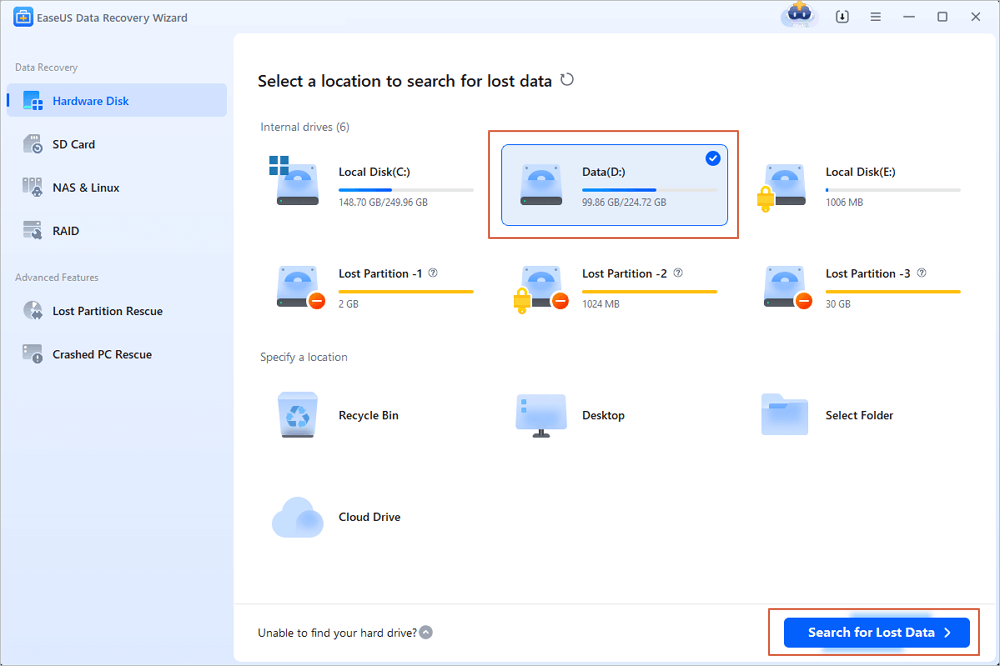
Step 2. Use "Filter" or "Search" to find the lost files when the scan completes.
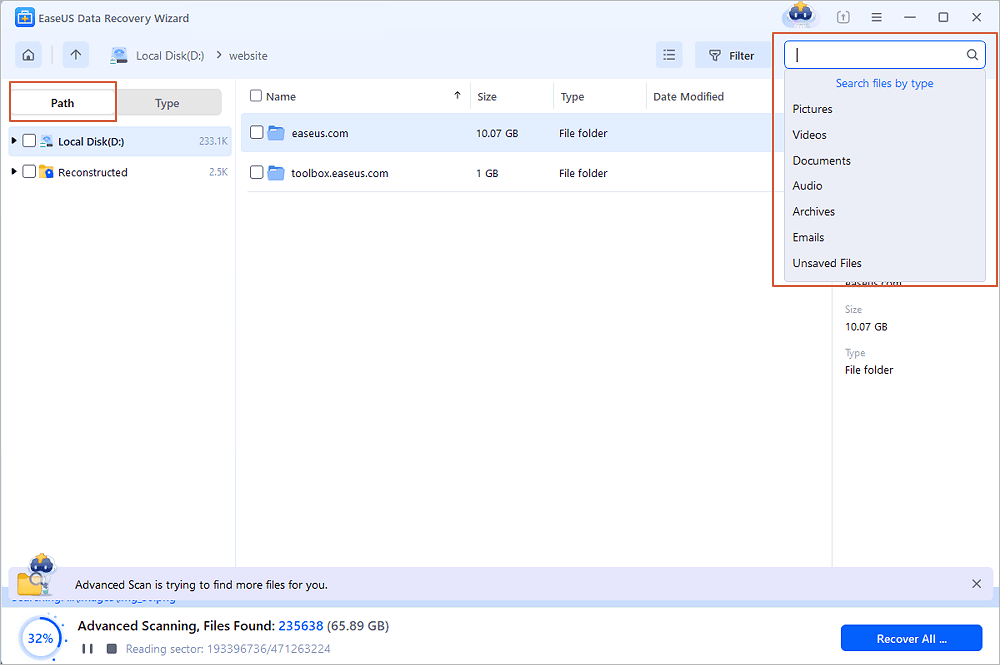
Step 3. Select all the files you want and click "Recover". Then, browse another secure location to save them.
💡Tip: You can restore data on the local disks, external hard drives, and also the cloud storage.
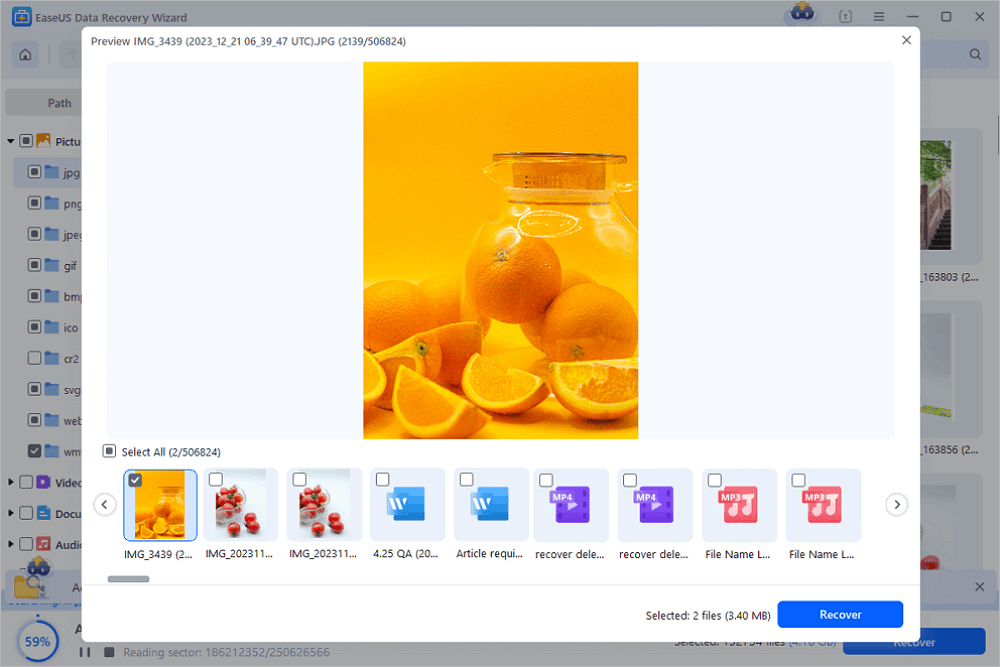
Many Windows 10/11 users have proved the efficacy of the tool. If you are interested in resolving the file recovery, share it on Facebook, Twitter, Linkedin, and other social media platforms!
Method 1. Unplug and Re-plug Device [Easiest]
Applies to: Fix device with structure false due to improper ejection, connection, or power supply issue.
The first method you can try is reconnecting the device to your PC when the computer pops up with the error "the disk management is corrupted and unreadable".
Step 1. Unplug the USB, SD card, or external drive from the PC.
Step 2. Re-plug the device into your PC and check if it's accessible.
Step 3. If inaccessible, change a USB port or a new USB cable, and reconnect it to PC.
Step 4. Connect the device to another computer if Step 3 doesn't work.
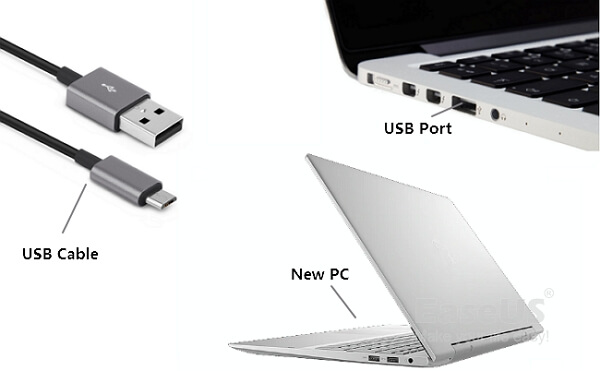
After trying all the steps, congratulations if your USB, external hard drive, or SD card shows up and can be accessed. You may stop here and make use of your device and data again.
If these simple fixes don't help, it's likely caused by file system errors or by hardware corruption in rare cases. Don't worry. Following the methods below, you still have a high chance of recovering your data and making your device usable again.
Method 2. Check Drive Letter and Repair Disk Errors via CHKDSK
Applies to: Repair hard disk, USB, SD card, or external hard drive corruptione issue caused by the invalid file system, RAW error, bad sectors, etc.
With an invalid file system, RAW error, or bad sectors on a storage device, you won't be able to access the device and its files.
You can either run CHKDSK in CMD or perform drive error checking and repair external hard drive. Both work exactly the same way.
Run CHDKSK to Fix Corrupted File System
- Warning
- Running chkdsk can hopefully fix the issue of the failed disk structure; however, it can also result in total data loss. So, perform data recovery before continuing with the CMD method.
Step 1. Click "Start" and type cmd in the Search box.
Step 2. Right-click "Command Prompt" and choose "Run as administrator".
Step 3. Type CHKDSK F: /f /r /x hit Enter.
(Replace F: with the drive letter of your corrupted or unreadable device. )
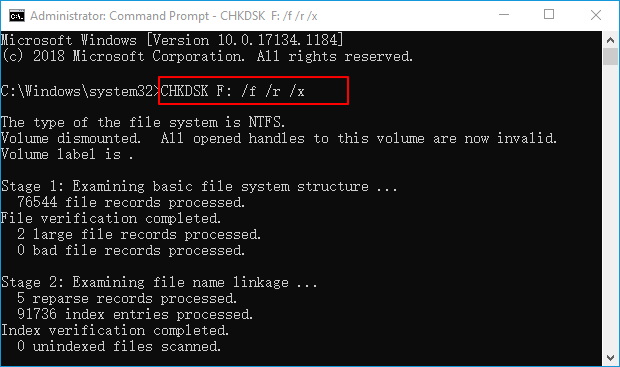
CHKDSK Alternative - Check Disk via Error Checking
Step 1. Go to "This PC". Right-click your drive and choose "Properties".
Step 2. Go to the "Tools" tab and click "Check" > "Scan drive".
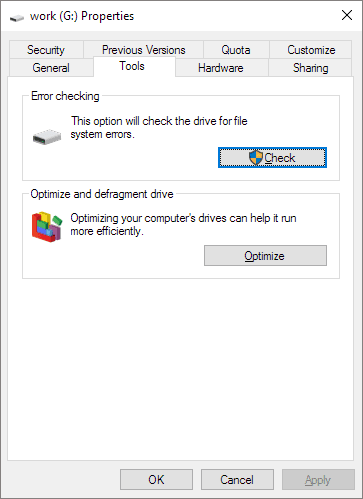
The error-checking tool will automatically scan and fix corrupted files on the target device for you.
Method 3. Reinstall Disk Drivers
Applies to: Fix unreadable devices that were not detected or inaccessible due to outdated disk drives in Device Manager.
Sometimes, when the disk is not initialized or outdated, Windows PC may not detect it nor fail to display it in File Explorer. So the best way out is to update the disk management of your USB, SD card, or external storage devices.
Here are the steps that you can follow to update the device driver:
Step 1. Connect the malfunctioned drive to the PC.
Step 2. Right-click This PC and choose "Manage".
Step 3. Click "Device Manager", then expand Disk drives.
Step 4. Find and right-click the problematic USB drive and select "Update driver".
Step 5. Click "automatically search for driver software online".
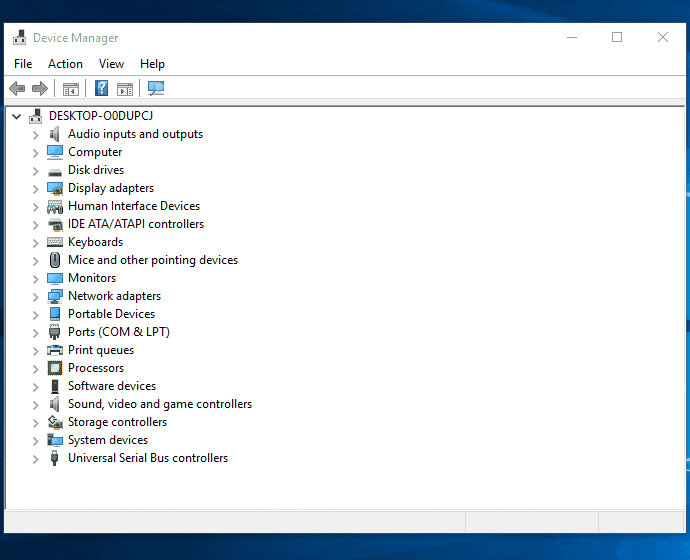
Wait for the driver to be updated, then reboot your computer. Afterward, you can try to reconnect your problematic drive to your PC and check whether the folder is not accessible in the Device Manager.
Method 4. Format to Fix Corrupted or Unreadable Drive [Most Effective]
This applies to: Fix the device's corrupt or unreadable issue due to an invalid file system, RAW error, or unsupported file system.
There is more than one way to format the disk in drive so as to make the problematic device readable again. Here, we'll show you the easiest one:
Step 1. Open "This PC".
Step 2. Right-click the disk management with the "structure is corrupted and unreadable" error message and choose "Format".
Step 3. Assign a file system to your drive and click "Start".
- For USB, SD card - FAT32, exFAT
- For External/Internal Hard Drive - NTFS
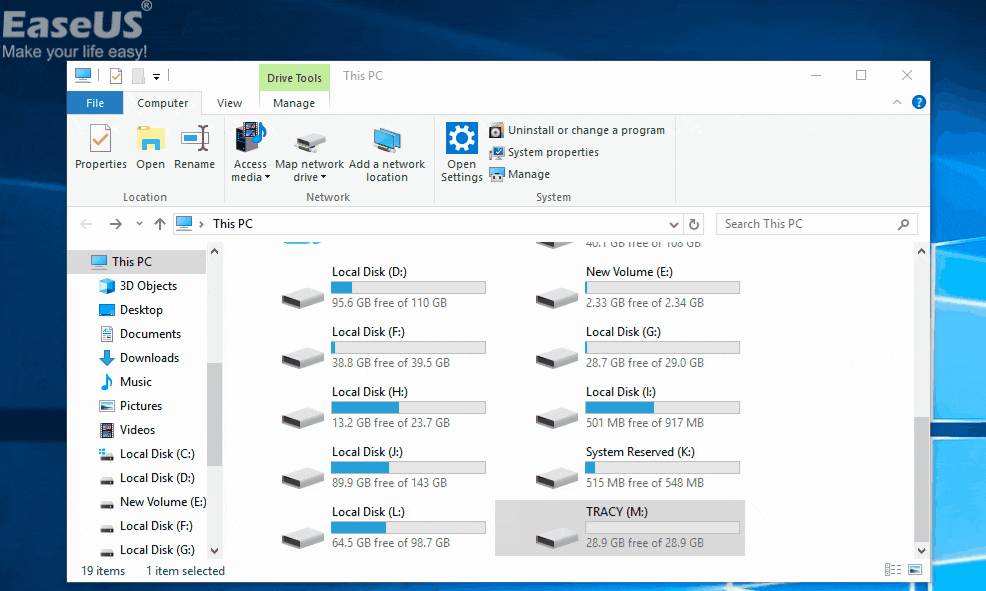
If you prefer to format the drive to ext2/3/4 or other file systems, the best formatting tool - EaseUS Partition Master could offer you a helping hand.
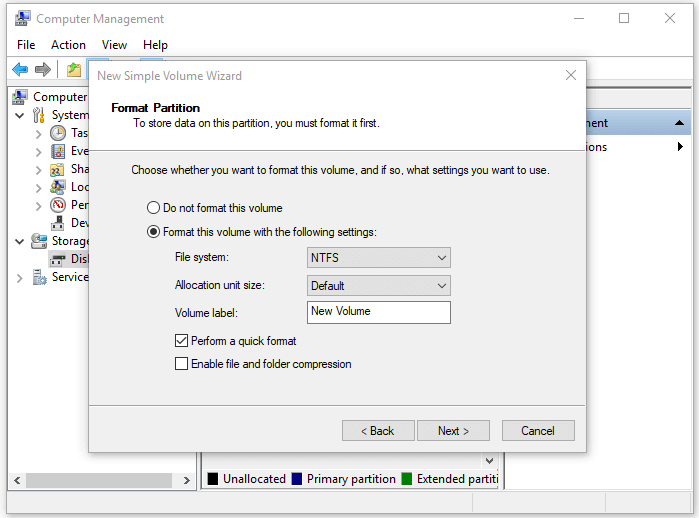
Fixes for External Hard Drive Not Formatted/Won't Format Error
TCommon external hard drive format errors include the external hard drive needs to be formatted and you cannot complete the format. Read more >>
Why the Disk Structure Is Corrupted and Unreadable
What is "the disk structure corrupted and unreadable" error? How to fix unreadable flash drives is one of the most universal hard disk corrupted problems that happen to external HDDs, memory cards, USB flash drives, and other storage devices.
With this error, users can't access the device nor open the saved files. Also, Windows will pop up a warning message, "Location is not available. Drive: \ is not accessible."
Why a hard drive, USB, or SD card suddenly becomes inaccessible? Generally, the error is caused by the following listed reasons:
- Improper ejection or unplugging device
- Connection issue
- Unstable power supply
- Corrupted File system errors - RAW, etc.
- Hardware issue
- Virus infection
How to Protect a Device from "Structure Corrupted or Unreadable" Error
After trying all the solutions mentioned above, the error "the disk structure is corrupted and unreadable" should have been addressed. And the valuable files will all be safely restored via EaseUS data recovery software.
Besides fixing this error, what matters more is protecting your device from this error. Here we've listed some tips for you to follow and safeguard your hard drives, USB, external hard drives, etc., from getting "USB drive not showing up", etc. errors:
- #1. Plug and unplug devices in a proper way
- #2. Update the device's driver timely
- #3. Set a Windows or device-compatible operating system to your device
- #4. Check disk health regularly
There are many ways to check the health of a hard drive, including using the manufacturer's tools, CHKDSK and WMIC. Here, we will show you how to use WMIC to check your drive status:
Step 1. Click "Start" and type cmd.
Step 2. Right-click "Command Prompt" and choose "Run as administrator".
Step 3. Enter the following commands in order:
wmic
diskdrive get status
If your disk status is not so good, back up all data in advance and send it for repair immediately.
LEARN MORE
Still curious? Click here to learn about error 0x80070570.
The Bottom Line
This page explained how to fix the disk structure is corrupted and unreadable error, and the causes of this issue.
Although there are many potential causes of the error, many users found the leading cause is file system errors, which can be perfectly fixed by formatting the device. To protect precious files on the hard drive, run EaseUS Data Recovery Wizard and then perform formatting.
Also the presented fixes can also be applied to fix similar issues:
- Fix a corrupted disk
- Fix a corrupted hard drive
- Fix a corrupted external hard drive
- Fix a corrupted SD card, USB, etc.
Was This Page Helpful?
Jaden is one of the editors of EaseUS, who focuses on topics concerning PCs and Mac data recovery. Jaden is committed to enhancing professional IT knowledge and writing abilities. She is always keen on new and intelligent products.
Approved by Evan Galasso
Evan Galasso is a digital forensics and data recovery engineer with over 10 years of experience in the field. He presents opinions on the current state of storage media, reverse engineering of storage systems and firmware, and electro-mechanical systems of SSDs and HDDs.
Related Articles
-
Külső merevlemez javítása | Nincs adatvesztés
![author icon]() Cedric/Jan 19, 2026
Cedric/Jan 19, 2026 -
How to Clone External Hard Drive to Another External Hard Drive
![author icon]() Jean/Jan 21, 2026
Jean/Jan 21, 2026 -
OS Cloning Software Free Download for Windows 11/10/8/7
![author icon]() Jerry/Jan 21, 2026
Jerry/Jan 21, 2026 -
Fix 'Please Insert a Disk into USB Drive' Without Losing Data
![author icon]() Jean/Feb 12, 2026
Jean/Feb 12, 2026